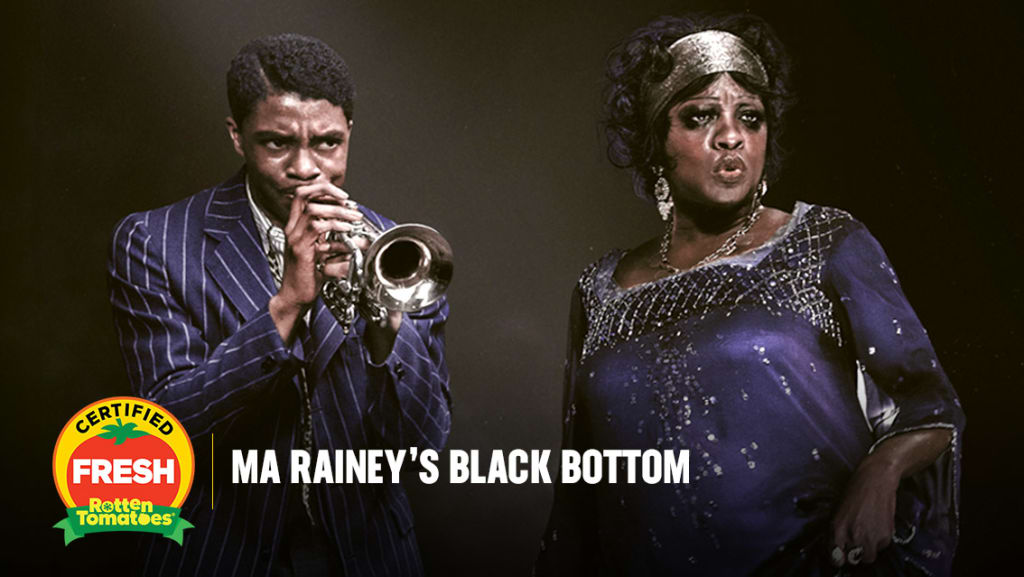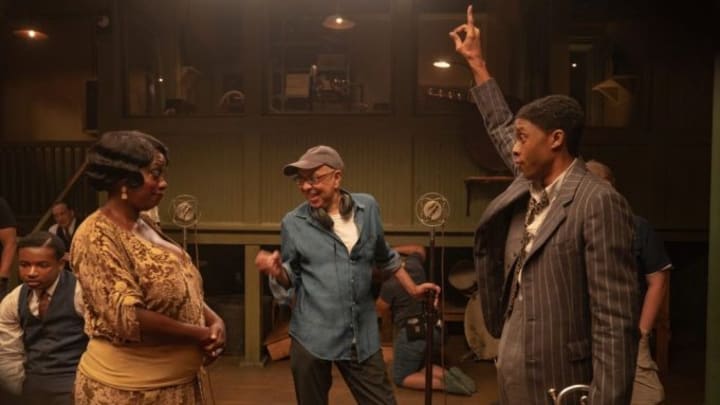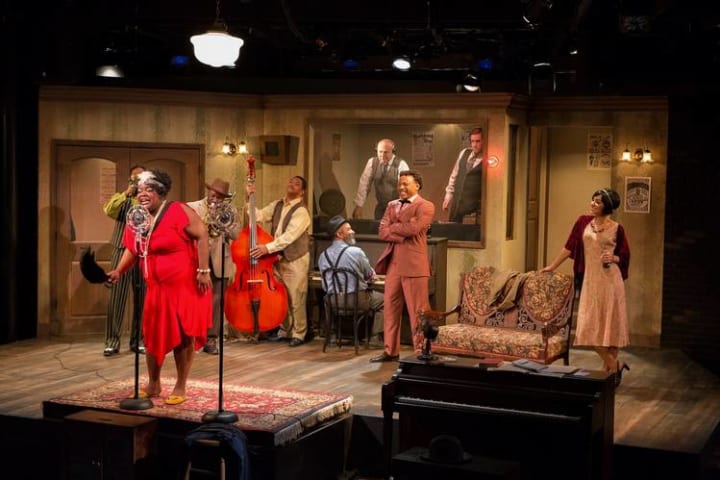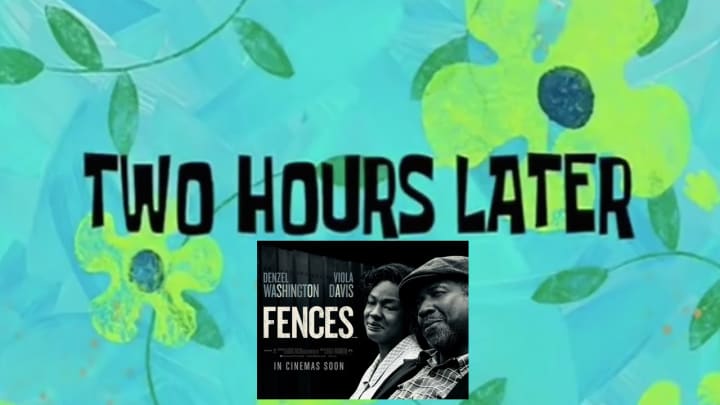Oh No! I Didn’t Like a 98% Fresh Movie
Why Ma Rainey's Black Bottom Wasn't For Me

Well, it finally happened. After years of being the pretentious film guy among many of my social circles, I met my match against a piece of Oscar bait I typically love. Ma Rainey’s Black Bottom showed me that there is in fact a “good” movie that I don’t like. By that, I mean I didn’t enjoy a movie that both critics and audiences agree is good. There are plenty of film scholar favorites like Jules and Jim and plenty of crowd pleasers like Venom that I don’t like, but each of those appeals to one base while alienating the other. Ma Rainey’s Black Bottom is the first true consensus pick that left me out in the cold, and yet everyone else is eating it up with its 87 on Metacritic, 7.1 on IMDb, and 98% critic and 78% audience scores on Rotten Tomatoes. Instead of taking the loss and moving onto other Oscar hopefuls, I wanted to dive into this anomaly and try to figure out exactly why I feel different than the general population.
Let’s begin with what I liked about the film. And you can’t go too far without talking about the performances because Chadwick Boseman and Viola Davis are taking everybody to school in this one. Boseman has to carry the brunt of the dialogue and emotional heft of the story, and he nails it and then some. Despite being the title character, Davis’s screen time is far below that of her costars, which would suggest she’s almost a supporting player in the story. However, every time she is onscreen, she takes over and is a force to be reckoned with, much like Anthony Hopkins in Silence of the Lambs, being considered a co-lead with only 21 minutes of screen time in a 118-minute movie (Viola Davis is in 26 minutes of a 94-minute movie). Even the rest of the cast shine brightly, while not receiving the same juiciness that the leads get, particularly Glynn Turman and Jeremy Shamos.

Also worthy of note, the production design, costumes, and makeup and hairstyling are great. Although the film is contained to two locations for the majority of its runtime, both locales feel real and lived in and beautiful; the lesser used spaces are equally sublime, especially a performance tent in the woods and downtown Chicago nearly a century ago. The costumes, makeup, and hairstyling on each character feels like a natural extension of who they all are, both in general and at the moment in time that we are seeing them. So if it isn’t the acting and the mise-en-scene, why don’t I like Ma Rainey’s Black Bottom?
Sticking with the technical elements for now, I can’t complain about the sound and music of the film because both felt competently executed, and they didn’t pull me out of the experience. However, the same can’t be said of the cinematography and editing. For something sub-100 minutes, it felt like it dragged on and on and on, but you wouldn’t think that from the pace of the movie, which goes from shot to shot at breakneck speed, especially in the scenes between Boseman and his bandmates where every line of dialogue gets a reaction shot or two, which is great for the actors but completely unnecessary. Shots change so quickly and seemingly without motivation that it feels like the movie wants you to forget you’re in the same room half the time and basically watching a play. Similarly, the cinematography feels almost too stylized and unmotivated, like its compensating for being in the same room half the time and trying to make you forget you’re basically watching a play…
Ah-ha, I may have stumbled into my issue. Let me set this up by saying that I love theatre (so much so that I used the –re spelling of “theatre”). I’ve been a theatre kid since elementary school, and I was the president of my theatre club college, so I have no bias against plays or other theatrical material.

For those who may think I don’t like movies based on plays, I assure you that I love Doubt and A Streetcar Named Desire and Much Ado About Nothing; I even liked One Night in Miami, another movie from 2020 based on a play about important black figures from the past, just in case you thought my dislike was very specific. There is an inherent flaw in adapting something for the screen meant to be performed live, and that is the suspension of disbelief. Ironically, when seeing real people on a real stage, plays can get away with outlandish dialogue and over-the-top acting because the audience is already there physically watching it happen, while live-action movies have more of a burden to reflect reality to be believed because the audience knows they’re watching a two-dimensional projection of something that was performed months to years ago.
All that is to say… yeah, the theatrical moments do feel weird and out of place watching them in this movie. Everything is heightened beyond what we’d assume, even if Boseman’s and Davis’s characters are meant to be a lot to begin with. As time goes by, we get backstories that explain why some of the characters are the way they are, but that doesn’t actually add depth to their characters because this information did not change the way I perceived them or their actions. Many times these speeches and monologues didn’t even sound like they came from characters but rather dissertations or philosophy books, which wouldn’t be a problem if those felt like they amounted to more than musings. This personified introspection succeeds here and there, like when Boseman’s character tries to convince the record producer to let him record his songs, and you see the white exploitation of black art that the characters have been talking about directly. But that is the exception rather than the rule, as most of the time it’s finger pointing and storytelling for the sake of finger pointing and storytelling.
With that said, a lot of plays and movies I like follow a similar pattern: day-in-the-life activities, meandering dialogue, and characters not focused on accomplishing plot-oriented goals. It makes me think that maybe it isn’t the concept of the writing but maybe the writer himself, August Wilson. I am not an expert on the playwright as a person, nor have I ever seen or read any of his other work, so to rectify this I am off to watch 2016’s Fences.

Okay, so I liked Fences. The first fifteen to twenty minutes frustrated me similarly to Ma Rainey’s Black Bottom, but over time I started wanting more of Denzel Washington chronicling his fictional fistfights with Death and Viola Davis berating her husband for not seeing her as anything more than a wife to settle for. The long drawn out stories and speeches added to both plot and character simultaneously, while there was still room for moments of quiet reflection and genuine interpersonal reflection. And although both films are meant to be works of drama, Fences utilizes humor more effectively, which allows the seriousness of the conversations and contemplations to have greater weight when they arise.
So why don’t I like Ma Rainey’s Black Bottom? I think it all boils down to the lack of engagement I had in both the characters and the story. That doesn’t mean it’s bad by any means or that I don’t think people should watch it. I think perhaps it’s best viewed as an art piece more than filmed entertainment. It shows the power one can wield with the right talent and belief in yourself, but it also shows the lengths people will go to to exploit such a talent for monetary gain, especially in racially motivated ways. A subject of the movie I never touched was the symbolism, mostly because it neither brought me deeper into the narrative nor did it take me out of it. But now that we’re in the discussion of “art,” it’s time.
The first notable moments of symbolism come in Ma’s two performances in front of crowds. The first is in a tent in the woods in Georgia. Ma stands on a stage jutting out into the audience, who participate in cheering and hollering whenever they want; it’s well lit so that you can pinpoint any background performer you want. While smaller and probably not bringing in as much money, this is home for Ma, both being in the South and in a venue that allows her to connect directly with the people who love her music and understand it more than those who wish to commodify it. Meanwhile, in her second performance at a theater in Chicago, a city located in the North, considered more tolerant of black people, Ma performs on a proscenium with blinding lights so that the audience is a darkened void of miscellaneous shouting; Ma’s dancers and bandmates steal focus from the headlining performer. Now Ma is in a foreign place where she is less comfortable, and with non-singing distractions onstage, Ma is less relevant as herself. Her trumpet player Levee can steal her spotlight and usher in the new generation of music, more about big band and dance music than soulful singing. All of this is done without dialogue, only through character choices and cinematic technique. There are many other instances of metaphor taking place like Levee’s battle with the green room door and the mechanical recording of Ma’s songs. While all of this is impressively done, it didn’t engage me beyond artistic recognition, which is why I can respect the craft of Ma Rainey's Black Bottom but also declare that I don't like it.
So is there a lesson in all this introspection and analysis? Honestly, probably not, but I hope one thing people can take away from this reading is that anyone can like or dislike anything for an infinite number of reasons. These reasons may be shallow, or the person may not be able to articulate exactly why they feel this way (as opposed to my over articulation here), but, as long as they don't misrepresent the actual facts of what's on screen, they are valid (even if they may feel painfully incorrect). So I hope you accept me as I am for not enjoying what will surely be a multiple Academy Award winning film.

About the Creator
Sam Pinnelas
Not born in a log cabin on a not stormy not night...






Comments
There are no comments for this story
Be the first to respond and start the conversation.